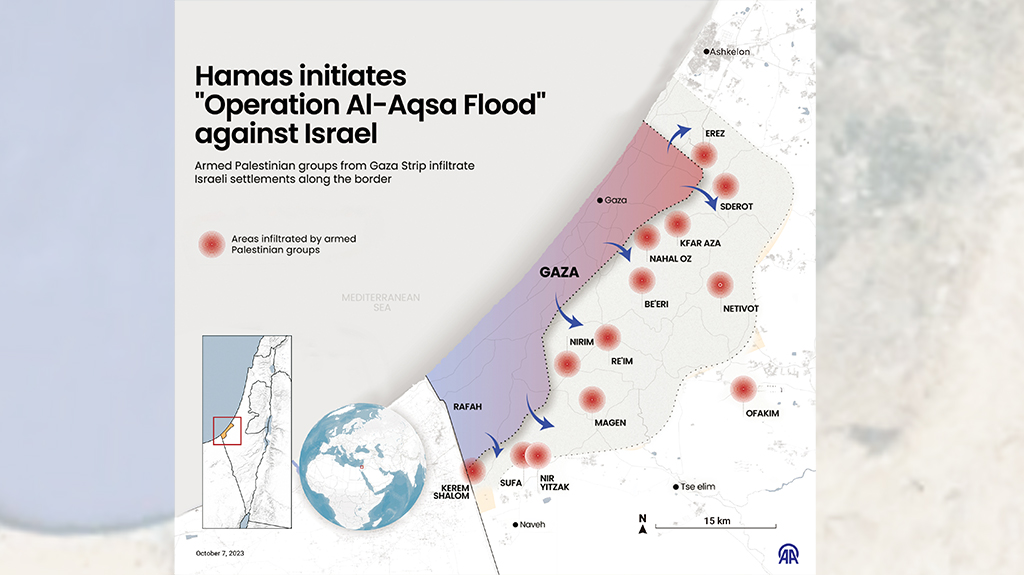This paper argues that the al-Aqsa Flood operation launched by the Izz ad-Din al-Qassam Brigades –the military wing of Hamas– on the morning of October 7 has led to a psychological and epistemological rupture in the Palestinian-Israeli conflict and Middle East politics as the operation marked a paradigm shift in the philosophy of the resistance. The infiltration of al-Qassam into the occupied territories by land, sea, and air was a clear sign of a change in the strategy of the resistance to continue the active struggle against the aggressive expansionism and aggression of the Zionist Israeli government. In this context, the study tries to frame Operation al-Aqsa Flood and analyze the dimensions of the rupture. Besides this, it will also outline the possible impact of the operation on global and regional politics, considering that the ongoing process will change the political balance in the Middle East.
Introduction
Fawaz Gerges, a prominent scholar in the field of Middle Eastern studies, offered a new perspective on the Arab Uprisings in the introduction of his 2014 edited volume
The Middle East: Protest and Revolution in the Arab World. In reference to the uprisings, Gerges states, “A psychological and epistemological rupture has occurred in the Arab Middle East that has shaken the authoritarian order to its very foundation and introduced a new language and a new era of contentious politics and revolutions.”
1 2014 coincided with the end of the popular revolutions in the Arab world, except Tunisia, and the establishment of the authoritarian status quo in Egypt, while Libya and Yemen plunged into major crises. Despite these negative indicators, the depiction of the process as a “psychological and epistemological rupture” was directly related to the legacy of the liberation motivation of the revolution for the upcoming years.
It would not be an exaggeration to say Operation al-Aqsa Flood has had a similar impact on the Arab world in relation to regional and global politics. The land, sea, and air infiltration of the resistance elements into the Israeli-occupied territories, which had been under blockade in a limited area for years, is a milestone in the Palestinian struggle against the Zionist occupation. In this respect, the operation launched by the Izz ad-Din al-Qassam Brigades, the military wing of Hamas, on the morning of October 7 marks a paradigm shift in the Palestinian resistance and a new era. At the same time, the recent rupture in the history of the modern Middle East caused by Operation al-Aqsa Flood clearly shows that this process will alter the region’s political balance. In this context, the present study attempts to frame the operation and analyze the dimensions of the rupture. It also outlines the possible effects of the operation on regional and global politics.
Framing Operation al-Aqsa Flood: A Psychological and Epistemological Rupture
Operation al-Aqsa Flood was a significant turning point in the Palestinian struggle, marking the most fundamental change in the philosophy of resistance since the First Intifada (1987). The Palestinians, who for many decades thought that they would end the occupation and establish an independent state thanks to the support of the Arab world, realized by the mid-1970s that the Arabs would not take the necessary steps in this regard. The leadership of the Palestinian resistance realized that the only path to progress depended on their own will and initiative, and launched a massive uprising against Israel with the power of its people. The First Intifada, therefore, led to a significant paradigm shift in the Palestinian resistance. Rather than waiting for a move from the international community or the Arab world, the local struggle against the occupying Zionist regime, albeit with limited means, could enable Palestine to make gains toward independence. This new strategy also allowed the Palestinian resistance to institutionalize and build a strong identity. Moreover, the establishment of the Islamic Resistance Movement (Hamas) at the beginning of the First Intifada
2 signaled that not only a methodological but also an ideological transformation would take place in the Palestinian resistance. As a matter of fact, in the following years, Hamas’ conception of the political order, the methods it used, the discourse it produced, and its clear stance against the Israeli occupation resulted in this movement finding a response throughout Palestine and becoming one of the most powerful actors in Palestinian political life.
3
Read more on
Insight Turkey:
Operation al-Aqsa Flood: A Rupture in the History of the Palestinian Resistance and Its Implications
[Insight Turkey, January 1, 2024]







